When it comes to choosing a family car that balances practicality, performance, and technology, two models stand out in 2024: the Hyundai Tucson and the Toyota Corolla Touring Sports. Each brings a unique offering to the table, catering to a range of consumer preferences and needs. In this comparison, we’ll delve into the technical specifications, innovations, and overall driving experience of these two vehicles to help you make an informed decision.
Hyundai Tucson vs Toyota Corolla Touring Sports - Differences and prices compared
Compare performance (288 HP vs 178 HP), boot space and price (20900 £ vs 29600 £ ) at a glance. Find out which car is the better choice for you – Hyundai Tucson or Toyota Corolla Touring Sports?
Design and Dimensions
The Hyundai Tucson, classified as an SUV, combines a robust aesthetic with functional dimensions. Measuring between 4,510 and 4,520 mm in length, 1,865 mm in width, and standing 1,650 mm high, it offers a commanding road presence.
On the other hand, the Toyota Corolla Touring Sports, a stylish wagon, measures 4,650 mm in length, 1,790 mm in width, and 1,435 mm in height. Its sleeker profile is not only attractive but enhances aerodynamics, making it suitable for both urban and highway driving.
Powertrain and Performance
The Tucson is available with multiple engine options, including diesel and petrol variants, producing between 136 to 252 HP. It offers a variety of transmissions, including automatic and manual gearboxes, and it can be had in both front-wheel and all-wheel drive. With power outputs coupled with excellent torque ratings (up to 367 Nm), acceleration figures range from 7.9 seconds to 11.6 seconds for 0-100 km/h, depending on the engine selected.
In contrast, the Corolla Touring Sports exclusively features a hybrid engine setup, generating between 140 to 196 HP from its 1.8-litre and 2.0-litre configurations. It uses a continuously variable transmission (CVT) and is front-wheel drive only. Acceleration is impressive for a wagon, achieving 0-100 km/h in as little as 7.5 seconds, showcasing Toyota's commitment to performance in their hybrids.
Fuel Efficiency and Emissions
Hyundai has equipped the Tucson with efficient powertrains, achieving fuel consumption figures ranging from 5.1 to 6.8 L/100 km. This makes it competitive in the SUV segment while minimizing CO2 emissions (from 126 to 153 g/km). Those looking for eco-friendly options can opt for the hybrid variants or the plug-in hybrid model, offering an electric range of up to 70 km.
The Toyota Corolla Touring Sports shines in fuel economy, with consumption figures as low as 4.4 L/100 km and CO2 emissions of just 100 g/km. Its hybrid technology ensures outstanding efficiency while still delivering an engaging driving experience.
Interior Comfort and Cargo Space
Step inside the Hyundai Tucson, and you'll find a spacious cabin designed for comfort and functionality. It comfortably seats five and has trunk capacities ranging between 546 and 620 liters, making it ideal for family trips or grocery runs.
The Corolla Touring Sports also accommodates five passengers and maximizes space with a trunk capacity of 581 to 596 liters. While it may not match the Tucson’s height and SUV feel, the thoughtful interior layout provides ample legroom and headspace for all occupants.
Innovative Technology and Features
Both models come equipped with modern technology. The Hyundai Tucson boasts a range of intuitive infotainment options, including large touchscreen displays, smartphone integration, and advanced driver-assistance systems. Features such as adaptive cruise control and lane-keeping assist enhance safety during drives.
The Corolla Touring Sports counters with Toyota’s renowned Safety Sense suite, integrating multiple features for proactive safety management. It supports a seamless infotainment experience through Apple CarPlay and Android Auto, ensuring connectivity on the go.
Conclusion: Which One to Choose?
Choosing between the Hyundai Tucson and Toyota Corolla Touring Sports ultimately depends on your lifestyle and preferences. If you’re looking for a versatile SUV with a range of powertrains and spacious cargo capacity, the Tucson stands as a strong contender. Conversely, if fuel efficiency and cutting-edge hybrid technology are your priorities, the Corolla Touring Sports may be the better fit.
Both vehicles represent their respective brands well, offering contemporary design, advanced features, and a satisfying driving experience. Test-driving both could be the key to finding your next family-friendly vehicle!
Here’s where it gets real: The technical differences in detail
Costs and Efficiency:
When it comes to price and running costs, the biggest differences usually appear. This is often where you see which car fits your budget better in the long run.
Hyundai Tucson has a significantly advantage in terms of price – it starts at 20900 £ , while the Toyota Corolla Touring Sports costs 29600 £ . That’s a price difference of around 8708 £.
Fuel consumption also shows a difference: Hyundai Tucson manages with 2.70 L and is therefore convincingly more efficient than the Toyota Corolla Touring Sports with 4.40 L. The difference is about 1.70 L per 100 km.
Engine and Performance:
Under the bonnet, it becomes clear which model is tuned for sportiness and which one takes the lead when you hit the accelerator.
When it comes to engine power, the Hyundai Tucson has a noticeable edge – offering 288 HP compared to 178 HP. That’s roughly 110 HP more horsepower.
Both models accelerate almost equally fast – 7.50 s from 0 to 100 km/h.
In terms of top speed, the Hyundai Tucson performs slightly better – reaching 204 km/h, while the Toyota Corolla Touring Sports tops out at 180 km/h. The difference is around 24 km/h.
Space and Everyday Use:
Beyond pure performance, interior space and usability matter most in daily life. This is where you see which car is more practical and versatile.
Both vehicles offer seating for 5 people.
In curb weight, Toyota Corolla Touring Sports is hardly perceptible lighter – 1485 kg compared to 1542 kg. The difference is around 57 kg.
In terms of boot space, the Hyundai Tucson offers slight more room – 620 L compared to 596 L. That’s a difference of about 24 L.
In maximum load capacity, the Hyundai Tucson performs somewhat better – up to 1799 L, which is about 193 L more than the Toyota Corolla Touring Sports.
When it comes to payload, Hyundai Tucson slightly takes the win – 545 kg compared to 440 kg. That’s a difference of about 105 kg.
Who wins the race in the data check?
The Hyundai Tucson holds a decisive overall lead in the objective data comparison.
This result only shows which model scores more points on paper – not which of the two cars feels right for you.
Costs and Consumption
View detailed analysis
Engine and Performance
View detailed analysis
Dimensions and Body
View detailed analysis

Hyundai Tucson
Hyundai Tucson
Hyundai Tucson marries bold, sculpted looks with a clever, roomy cabin that feels smarter than its price tag suggests. It's composed on the road, easy to live with day-to-day, and a sensible choice for buyers who want SUV style without the showroom theatrics.
details




Toyota Corolla Touring Sports
The Toyota Corolla Touring Sports is a sensible yet stylish estate that blends everyday practicality with Toyota's trademark reliability, making it the kind of car that quietly gets on with family life without drama. Inside it's cleverly packaged for luggage and kids' gear and feels calm and comfortable on the road — sensible rather than flashy, but with enough character to make daily drives more enjoyable.
details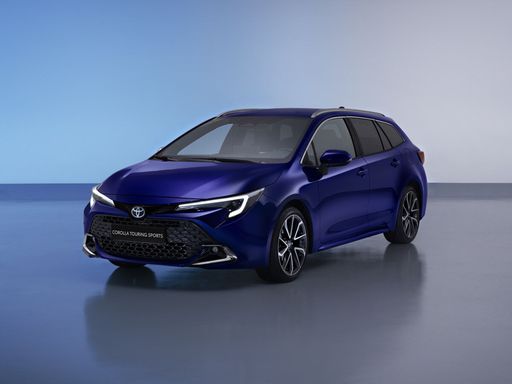
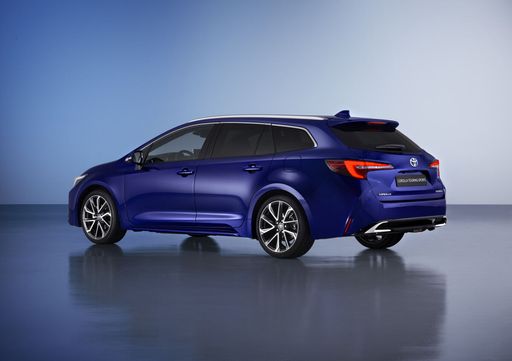
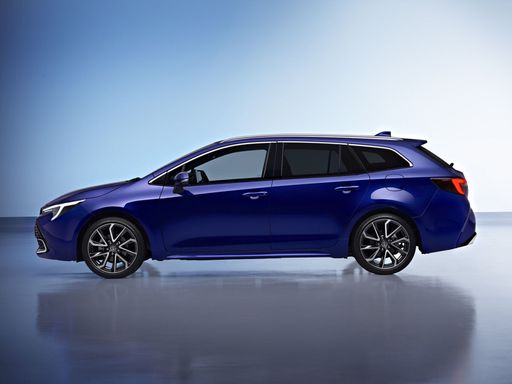
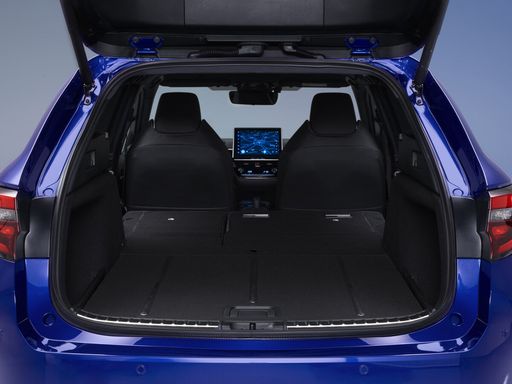
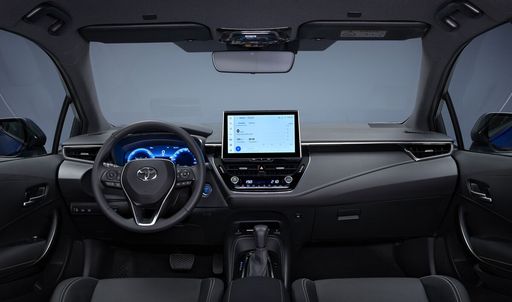
Costs and Consumption |
|
|---|---|
|
Price
20900 - 47900 £
|
Price
29600 - 36400 £
|
|
Consumption L/100km
2.7 - 7.6 L
|
Consumption L/100km
4.40 L
|
|
Consumption kWh/100km
-
|
Consumption kWh/100km
-
|
|
Electric Range
63 - 70 km
|
Electric Range
-
|
|
Battery Capacity
-
|
Battery Capacity
-
|
|
co2
62 - 172 g/km
|
co2
100 g/km
|
|
Fuel tank capacity
52 - 54 L
|
Fuel tank capacity
43 L
|
Dimensions and Body |
|
|---|---|
|
Body Type
SUV
|
Body Type
Estate
|
|
Seats
5
|
Seats
5
|
|
Doors
5
|
Doors
5
|
|
Curb weight
1542 - 1893 kg
|
Curb weight
1485 - 1515 kg
|
|
Trunk capacity
546 - 620 L
|
Trunk capacity
581 - 596 L
|
|
Length
4525 - 4535 mm
|
Length
4650 mm
|
|
Width
1865 mm
|
Width
1790 mm
|
|
Height
1650 mm
|
Height
1435 mm
|
|
Max trunk capacity
1795 - 1799 L
|
Max trunk capacity
1591 - 1606 L
|
|
Payload
518 - 545 kg
|
Payload
400 - 440 kg
|
Engine and Performance |
|
|---|---|
|
Engine Type
Petrol, Full Hybrid, Plugin Hybrid, Diesel MHEV
|
Engine Type
Full Hybrid
|
|
Transmission
Manuel, Automatic
|
Transmission
Automatic
|
|
Transmission Detail
Manual Gearbox, Dual-Clutch Automatic, Automatic Gearbox
|
Transmission Detail
CVT
|
|
Drive Type
Front-Wheel Drive, All-Wheel Drive
|
Drive Type
Front-Wheel Drive
|
|
Power HP
136 - 288 HP
|
Power HP
140 - 178 HP
|
|
Acceleration 0-100km/h
7.5 - 11.6 s
|
Acceleration 0-100km/h
7.5 - 9.2 s
|
|
Max Speed
196 - 204 km/h
|
Max Speed
180 km/h
|
|
Torque
250 - 379 Nm
|
Torque
-
|
|
Number of Cylinders
4
|
Number of Cylinders
4
|
|
Power kW
100 - 212 kW
|
Power kW
103 - 131 kW
|
|
Engine capacity
1598 cm3
|
Engine capacity
1798 - 1987 cm3
|
General |
|
|---|---|
|
Model Year
2025
|
Model Year
2025
|
|
CO2 Efficiency Class
F, D, E, B
|
CO2 Efficiency Class
C
|
|
Brand
Hyundai
|
Brand
Toyota
|
What drive types are available for the Hyundai Tucson?
Available configurations include Front-Wheel Drive or All-Wheel Drive.
